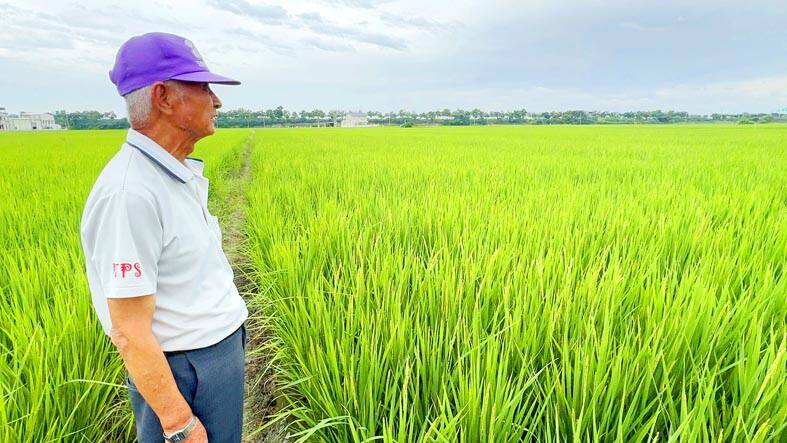The government must take into account WTO regulations before it adjusts the public grain procurement price, the Ministry of Agriculture said yesterday.
The price at which the government purchases grain is under scrutiny after opposition lawmakers proposed raising it to guarantee the income of rice farmers.
The public grain procurement price has not been adjusted for 13 years despite inflation, opposition lawmakers said in a written motion, adding that the government should raise the procurement price by NT$5 per kilogram to better protect farmers.

Photo: Lee Wen-de, Taipei Times
“The objective of the public grain procurement system is to increase the profits that farmers can make, which would not necessarily be achieved by increasing the procurement price,” Minister of Agriculture Chen Junne-jih (陳駿季) told reporters on the sidelines of an event in Taipei yesterday.
Any agricultural policy must ensure that farmers benefit from it and enable the agricultural industry to progress, Chen said.
Chen also warned that the public grain procurement system could contravene WTO regulations on reducing domestic support in agriculture.
“The WTO regulations impose a cap on domestic support in the agricultural industry. Any excessive financial support from the government could cause Taiwan to breach the regulations. It is a factor we must take into consideration when implementing any changes to the public grain procurement system,” he said.
Discussions over amending the public grain procurement system must consider different aspects, particularly as we are trying to join various international trade organizations, Chen said.
Former minister of agriculture Chen Chi-chung (陳吉仲) also warned that opposition lawmakers’ proposal would only push down the price of rice and would not increase the income of rice farmers.
Raising rice procurement prices could expand the nation’s rice fields from 23,000 hectares to 30,000 hectares, causing supply to further exceed demand, Chen Chi-chung said.
When 14,000 tonnes of annual rice imports is added, the excess supply of rice could top 500,000 tonnes, he said.
Such a policy could impede the progress that has already been made in diversification of grain production, he added.
For rice farmers to increase their income, Chen Chi-chung suggested that the government amend the rice income insurance system. The basic income for rice farmers who secure certifications for organic products, present production and sales history of their products, and adopt eco-friendly cultivation techniques can be NT$168,000 per hectare.
The income for cultivating rice is about NT$150,000 per hectare, and the insurance plan could make up the difference of NT$18,000, he said, adding that this is the only way to ensure that rice farmers can earn NT$5 more per kilogram.

Chinese spouse and influencer Guan Guan’s (關關) residency permit has been revoked for repeatedly posting pro-China videos that threaten national security, the National Immigration Agency confirmed today. Guan Guan has said many controversial statements in her videos posted to Douyin (抖音), including “the red flag will soon be painted all over Taiwan” and “Taiwan is an inseparable part of China,” and expressing hope for expedited reunification. The agency last year received multiple reports alleging that Guan Guan had advocated for armed reunification. After verifying the reports, the agency last month issued a notice requiring her to appear and explain her actions. Guan

GIVE AND TAKE: Blood demand continues to rise each year, while fewer young donors are available due to the nation’s falling birthrate, a doctor said Blood donors can redeem points earned from donations to obtain limited edition Formosan black bear travel mugs, the Kaohsiung Blood Center said yesterday, as it announced a goal of stocking 20,000 units of blood prior to the Lunar New Year. The last month of the lunar year is National Blood Donation Month, when local centers seek to stockpile blood for use during the Lunar New Year holiday. The blood demand in southern Taiwan — including Tainan and Kaohsiung, as well as Chiayi, Pingtung, Penghu and Taitung counties — is about 2,000 units per day, the center said. The donation campaign aims to boost

The Kaohsiung Tourism Bureau audited six hotels in an effort to prevent price gouging ahead of Korean band BTS’ concert tour in the city scheduled for Nov. 19, 21 and 22 this year. The bureau on Friday said that the audits — conducted in response to allegations of unfair pricing posted on social media — found no wrongdoing. These establishments included the local branches of Chateau de Chine, Hotel Nikko, My Humble House, and Grand Hai Lai, it said, adding that the Consumer Protection Commission would have penalized price gougers had the accusations been substantiated. The bureau said the Tourism Development Act

The Central Weather Administration (CWA) said a magnitude 4.9 earthquake that struck off the coast of eastern Taiwan yesterday was an independent event and part of a stress-adjustment process. The earthquake occurred at 4:47pm, with its epicenter at sea about 45.4km south of Yilan County Hall at a depth of 5.9km, the CWA said. The quake's intensity, which gauges the actual effects of a temblor, was highest in several townships in Yilan and neighboring Hualien County, where it measured 4 on Taiwan's seven-tier intensity scale, the CWA said. Lin Po-yu (林柏佑), a division chief at the CWA's Seismological Center, told a news conference